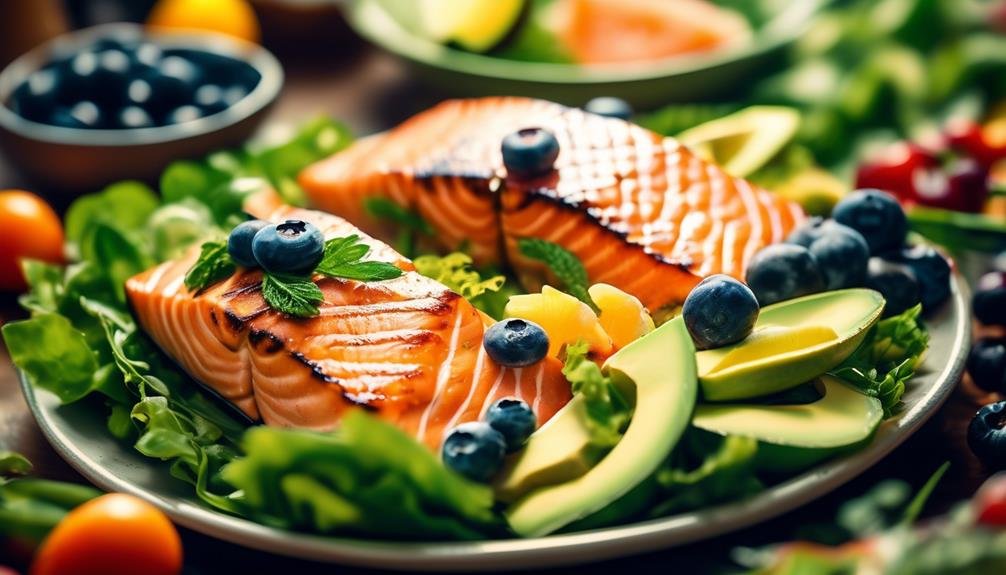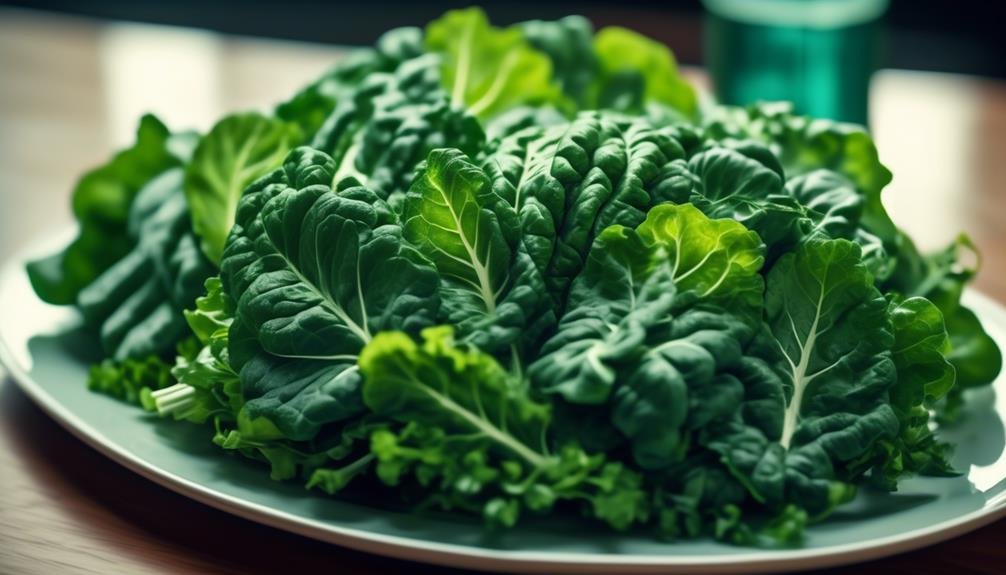"Cherishing Little Steps - A Haven for Baby and Family Journeys"
Brain-Boosting Foods for Kids
Are you looking for ways to help your child excel in school and boost their brain power? Look no further than your kitchen!
Did you know that certain foods can actually enhance cognitive function and improve focus in children? From the delicious sweetness of dark chocolate to the vibrant blue hue of blueberries, there are a variety of brain-boosting foods that can give your child's mental abilities a much-needed boost.
So, what are these foods and how can they benefit your child's brain? Let's explore together and discover the secrets to unlocking your child's full potential.
Key Takeaways
- Blueberries and dark chocolate are rich in antioxidants that protect the brain and improve memory and learning abilities in children.
- Fish, especially those rich in omega-3 fatty acids like salmon and sardines, support brain growth and function, enhancing cognitive function and memory.
- Regular consumption of nuts, such as almonds, walnuts, and cashews, can improve cognitive function due to their healthy fats, vitamin E, and brain-boosting nutrients.
- Leafy greens like spinach provide vitamins and minerals that support brain health and function, enhancing memory and concentration in children.
Blueberries: Nature's Brain Powerhouse

Blueberries are truly nature's brain powerhouse, packed with essential nutrients that can enhance cognitive function in kids. These tiny berries are loaded with antioxidants that protect the brain from oxidative stress and inflammation. Research suggests that the antioxidants in blueberries can improve memory and learning abilities in children.
One great way to incorporate blueberries into your child's diet is by making brain-boosting smoothies. Blend together a cup of blueberries, a banana, a handful of spinach, and a splash of almond milk for a delicious and nutritious treat. You can also add a tablespoon of chia seeds for an extra omega-3 boost, which supports brain health.
Another way to incorporate blueberries into kid-friendly snacks is by adding them to yogurt or oatmeal. Sprinkle a handful of blueberries onto a bowl of Greek yogurt or mix them into a serving of oatmeal for a tasty and brain-boosting breakfast. You can also make blueberry muffins or pancakes using whole wheat flour and Greek yogurt for a healthier twist.
Incorporating blueberries into your child's diet is a simple and delicious way to boost their brain power. Whether it's through brain-boosting smoothie recipes or incorporating blueberries into kid-friendly snacks, these little berries can make a big difference in your child's cognitive function.
Dark Chocolate: A Sweet Treat for Sharp Minds
For a delicious and brain-boosting treat, indulge in dark chocolate as a sweet way to enhance cognitive function. When it comes to chocolate alternatives, dark chocolate takes the cake. Not only does it satisfy your sweet tooth, but it also offers a range of benefits for your brain.
Dark chocolate contains flavonoids, which are powerful antioxidants that can improve blood flow to the brain. This increased blood flow can enhance cognitive function and improve memory and focus. Furthermore, dark chocolate contains caffeine and theobromine, stimulants that can provide a temporary energy boost and improve alertness.
In addition to its cognitive benefits, dark chocolate is also rich in minerals such as iron, magnesium, and zinc, which are important for brain health. These minerals play a crucial role in neurotransmitter synthesis and brain cell communication.
However, it's important to remember that not all chocolate is created equal. Opt for dark chocolate with a cocoa content of at least 70% to reap the maximum benefits. Be mindful of your portion sizes as well, as dark chocolate is still high in calories and should be enjoyed in moderation.
Fish: The Ultimate Brain Food

When it comes to boosting brain power, another food that deserves your attention is fish. Fish is often referred to as the ultimate brain food because it's rich in omega-3 fatty acids, which have been shown to have numerous benefits for brain development. Omega-3 fatty acids, particularly DHA (docosahexaenoic acid), are essential for the growth and function of the brain. They play a crucial role in maintaining the structure and function of brain cells, and have been linked to improved cognitive function and memory.
Incorporating fish into your child's diet can be easy and delicious. Start by introducing fish at an early age, as this is when the brain is rapidly developing. You can begin with mild-tasting fish like cod or haddock, and gradually introduce stronger flavors like salmon or trout. Fish can be cooked in various ways, such as baking, grilling, or poaching, to retain its nutritional value. You can also try adding fish to dishes your child already enjoys, like fish tacos or fish sticks.
To ensure your child is getting enough omega-3 fatty acids, aim for at least two servings of fish per week. Some examples of fish that are high in omega-3s include salmon, mackerel, sardines, and trout. If your child isn't a fan of fish, you can consider fish oil supplements, but it's always best to consult with a pediatrician before starting any supplements.
Incorporating fish into your child's diet is a simple and effective way to support their brain development. By providing them with the benefits of omega-3 fatty acids, you're giving them a solid foundation for cognitive growth and overall brain health. So, why not dive into the world of fish and give your child's brain a boost?
Nuts: Tiny Powerhouses for Big Brains
Nuts, packed with essential nutrients and antioxidants, are tiny powerhouses that can greatly benefit your child's brain health. These little wonders are not only delicious but also play a crucial role in boosting intelligence and supporting brain development.
When it comes to nuts and intelligence, research suggests that regular nut consumption is associated with improved cognitive function. Nuts are rich in healthy fats, such as omega-3 fatty acids, which are essential for brain health. These fats help build brain cell membranes and support the transmission of information between brain cells, enhancing your child's cognitive abilities.
Furthermore, nuts are a great source of vitamin E, which acts as a powerful antioxidant in the brain. Antioxidants help protect brain cells from damage caused by free radicals, reducing the risk of cognitive decline and supporting optimal brain function.
To give you an idea of the incredible nutritional value of nuts, take a look at this table:
| Nut | Key Nutrients |
|---|---|
| Almonds | Vitamin E, Magnesium |
| Walnuts | Omega-3 fatty acids |
| Cashews | Zinc, Iron |
Incorporating a variety of nuts into your child's diet can provide them with a wide range of nutrients that contribute to their brain health. So, go ahead and add nuts to their snacks or meals to nourish their growing brains and enhance their cognitive abilities.
Leafy Greens: Fuel for Cognitive Excellence

Rich in essential nutrients and antioxidants, leafy greens are another powerhouse food that can fuel cognitive excellence in children. Spinach, in particular, is a leafy green that offers numerous benefits for cognitive development. Packed with vitamins A, C, and K, as well as folate and iron, spinach supports brain health and function. Studies have shown that consuming spinach regularly can enhance memory and concentration, improving overall cognitive performance in children.
Incorporating leafy greens into your child's meals doesn't have to be a challenge. One of the best ways to introduce spinach to your child's diet is by adding it to smoothies. A handful of fresh spinach can easily be blended with other fruits and vegetables to create a nutritious and delicious drink. Another idea is to sneak spinach into pasta sauces or soups. Finely chopping the leaves or using frozen spinach can make it virtually undetectable, while still providing all the benefits.
Additionally, you can try making green wraps or salads with leafy greens as a base. Lettuce leaves can be used as a healthy alternative to tortillas, and spinach or kale can be the main ingredient in a vibrant and nutritious salad. By incorporating leafy greens in creative and tasty ways, you can ensure that your child receives the cognitive-boosting benefits of these nutrient-rich foods.
Whole Grains: Keeping Young Minds Focused
To keep your child's mind focused, it's essential to incorporate whole grains into their diet. Whole grains are an excellent source of nutrients that support brain health and function. They provide a steady release of energy, keeping your child's brain fueled throughout the day. Whole grains also contain fiber, which aids in digestion and promotes a healthy gut, known to have a positive impact on brain function.
Including whole grains in your child's diet can be easy and delicious. Consider offering healthy snacks like whole grain crackers or popcorn instead of processed options. For breakfast, choose whole grain cereals or oatmeal. These options provide a good amount of fiber and nutrients, giving your child a great start to their day.
Research has shown that children who consume whole grains regularly perform better academically and have improved attention and memory skills. Additionally, the nutrients found in whole grains, such as B vitamins and antioxidants, support brain development and protect against cognitive decline.
Frequently Asked Questions
How Much Blueberries Should My Child Consume Daily to See the Brain-Boosting Benefits?
To see brain-boosting benefits, your child should consume a daily serving of blueberries. Blueberries have been shown to support brain development in children, making them a delicious and nutritious addition to their diet.
Can Dark Chocolate Be Harmful to a Child's Health if Consumed in Excess?
Excessive consumption of dark chocolate can be harmful to your child's health. It may lead to weight gain, tooth decay, and an increased risk of heart disease. Moderation is key for enjoying its benefits without negative effects.
Are There Any Specific Types of Fish That Are More Beneficial for Brain Development in Children?
To boost your child's brain development, try incorporating fish options other than salmon and tuna into their diet. These alternatives, rich in omega-3 fatty acids, are beneficial for cognitive function and brain health.
How Can I Incorporate Nuts Into My Child's Diet if They Have a Nut Allergy?
You can still incorporate nuts into your child's diet even if they have a nut allergy. There are plenty of nut-free alternatives for brain-boosting foods, like chia seeds, flaxseeds, and sunflower seeds, that provide similar nutritional benefits.
Are There Any Particular Leafy Greens That Are More Effective in Enhancing Cognitive Abilities in Children?
You'll be happy to know that certain leafy greens can do wonders for your child's cognitive abilities. Spinach and kale, for example, are packed with antioxidants that aid in brain development.
Conclusion
So there you have it, folks! Incorporating brain-boosting foods like blueberries, dark chocolate, fish, nuts, leafy greens, and whole grains into your child's diet can have a significant impact on their cognitive abilities.
These nutritional powerhouses provide the necessary nutrients to fuel their growing brains and keep them focused.
So why wait? Start serving up these tasty treats and watch your child's brain power soar!
It's time to give their minds the boost they deserve!



Thanks for sharing. I read many of your blog posts, cool, your blog is very good.